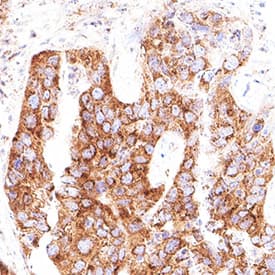Human NKp80/KLRF1 PE-conjugated Antibody Summary
Val66-Tyr231
Accession # Q9NZS2
Customers also Viewed
Applications
Please Note: Optimal dilutions should be determined by each laboratory for each application. General Protocols are available in the Technical Information section on our website.
Scientific Data
 View Larger
View Larger
Detection of NKp80/KLRF1 in Human PBMCs by Flow Cytometry. Human peripheral blood mononuclear cells (PBMCs) were stained with Rat Anti-Human NKp80/KLRF1 PE-conjugated Monoclonal Antibody (Catalog # FAB1900P) and Mouse Anti-Human NCAM-1/CD56 APC-conjugated Monoclonal Antibody (Catalog # FAB2408A). View our protocol for Staining Membrane-associated Proteins.
Preparation and Storage
- 12 months from date of receipt, 2 to 8 °C as supplied.
Background: NKp80/KLRF1
NKp80, also known as killer cell lectin-like receptor subfamily F member 1 (KLRF1), is an 80 kDa type II transmembrane, homodimeric, activating co‑receptor expressed exclusively on the surface of NK cells. Human NKp80, a member of the C-type lectin family of proteins (1‑3), is 231 aa in length with a 38 amino acid (aa) cytoplasmic region, a 21 aa transmembrane region, and a 172 aa extracellular domain (ECD). The ECD contains the C-type lectin-like domain (aa 114‑230) and four potential sites of N-linked glycosylation. Multiple splicing variants produce four isoforms for NKp80. Isoform 1 is the standard protein. There are no murine orthologs for NKp80 (4). NKp80 functions as an inhibitory receptor based on the presence of two immunoreceptor tyrosine‑based inhibitory motifs (ITIM) in the N-terminal cytoplasmic region and the lack of charged amino acids in the transmembrane region (1). However, later studies show that NKp80 displays an activating function rather than an inhibitory one (2‑3, 5). In in vitro experiments in human NK cells, NKp80 stimulates NK cell cytotoxicity and induces calcium influx after triggering by appropriate antibodies (2, 3). One study reports that NKp80 likely functions as a co‑receptor, cooperating with NKp46 and other activating receptors in NK cell cytotoxicity (2). Activation-induced C-type lectin (AICL) is the ligand for NKp80 (3). It is a myeloid-specific receptor expressed by monocytes, macrophages, and granulocytes (3). Crosslinking of both NKp80 and AICL stimulates secretion of proinflammatory cytokines suggesting that NKp80‑AICL interaction is involved in the activating crosstalk between NK cells and myeloid cells, and thus may influence the initiation and maintenance of immune responses in humans (3).
- Roda-Navarro, P. et al. (2000) Eur. J. Immunol. 30:568.
- Vitale, M. et al. (2001) Eur. J. Immunol. 31:233.
- Welte, S. et al. (2006) Nat. Immunol. 7:1334.
- Yokoyama, W.M. and B.F. Plougastel (2003) Nat. Rev. Immunol. 3:304.
- Thomas, M. et al. (2008) Proc. Natl. Acad. Sci. U.S.A. 105:1656.
Product Datasheets
Citations for Human NKp80/KLRF1 PE-conjugated Antibody
R&D Systems personnel manually curate a database that contains references using R&D Systems products. The data collected includes not only links to publications in PubMed, but also provides information about sample types, species, and experimental conditions.
6
Citations: Showing 1 - 6
Filter your results:
Filter by:
-
Potently Cytotoxic Natural Killer Cells Initially Emerge from Erythro-Myeloid Progenitors during Mammalian Development
Authors: Carissa Dege, Katherine H. Fegan, J. Philip Creamer, Melissa M. Berrien-Elliott, Stephanie A. Luff, Darren Kim et al.
Developmental Cell
-
Human MAIT cells are xenobiotic-resistant, tissue-targeted, CD161hi IL-17-secreting T cells.
Authors: Dusseaux M, Martin E, Serriari N, Peguillet I, Premel V, Louis D, Milder M, Le Bourhis L, Soudais C, Treiner E, Lantz O
Blood, 2010-11-17;117(4):1250-9.
Species: Human
Sample Types: Whole Cells
Applications: Flow Cytometry -
Analysis of CD16+CD56dim NK cells from CLL patients: evidence supporting a therapeutic strategy with optimized anti-CD20 monoclonal antibodies.
Authors: Le Garff-Tavernier M, Decocq J, de Romeuf C, Parizot C, Dutertre CA, Chapiro E, Davi F, Debre P, Prost JF, Teillaud JL, Merle-Beral H, Vieillard V
Leukemia, 2010-10-26;25(1):101-9.
Species: Human
Sample Types: Whole Cells
Applications: Flow Cytometry -
High log-scale expansion of functional human natural killer cells from umbilical cord blood CD34-positive cells for adoptive cancer immunotherapy.
Authors: Spanholtz J, Tordoir M, Eissens D, Preijers F, van der Meer A, Joosten I, Schaap N, de Witte TM, Dolstra H
PLoS ONE, 2010-02-15;5(2):e9221.
Species: Human
Sample Types: Whole Cells
Applications: Flow Cytometry -
Binding of excreted and/or secreted products of adult hookworms to human NK cells in Necator americanus-infected individuals from Brazil.
Authors: Teixeira-Carvalho A, Fujiwara RT, Stemmy EJ, Olive D, Damsker JM, Loukas A, Correa-Oliveira R, Constant SL, Bethony JM
Infect. Immun., 2008-10-06;76(12):5810-6.
Species: Human
Sample Types: Whole Cells
Applications: Flow Cytometry -
New insights into the phenotype of human dendritic cell populations.
Authors: Clark GJ et al.
Clin Transl Immunology
FAQs
No product specific FAQs exist for this product, however you may
View all Antibody FAQsReviews for Human NKp80/KLRF1 PE-conjugated Antibody
There are currently no reviews for this product. Be the first to review Human NKp80/KLRF1 PE-conjugated Antibody and earn rewards!
Have you used Human NKp80/KLRF1 PE-conjugated Antibody?
Submit a review and receive an Amazon gift card.
$25/€18/£15/$25CAN/¥75 Yuan/¥2500 Yen for a review with an image
$10/€7/£6/$10 CAD/¥70 Yuan/¥1110 Yen for a review without an image



